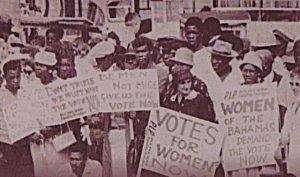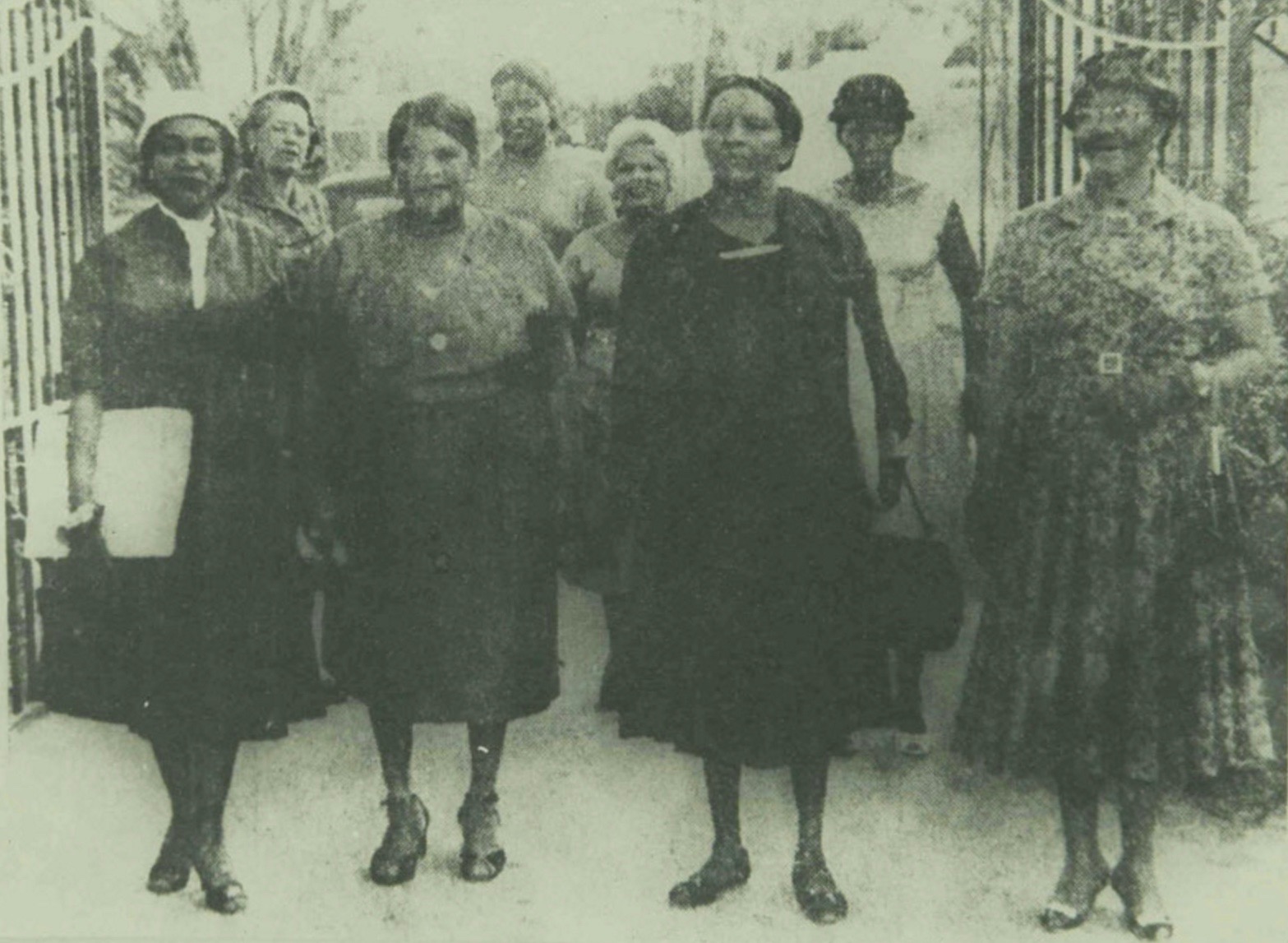Although both men and women migrated to the United States of America, the majority of Bahamian migrants were males. The objective was to work and send remittances home to provide for their families. However, many men once in the United States became sidetracked or simply lost sight of their main goal. Thousands of these men who moved to the U.S.A. began to feel there was a better life there. They no longer wanted to bear the burden of caring for a family in a different country. Calvin Bethel, a Bahamian worker on The Contract, explained: “It made it good for us, workin’. We didn’t actually, say, enjoy [working on The Contract]. But the way t’ings was home, it beat home”. This simply meant that although working on The Contract was not always pleasant or easy it was better to have a job in a different country than to be back in The Bahamas without a job and barely able to provide for themselves or their family. Some women say that after about a year on The Contract their husbands stopped writing letters to them. Even when they would write to their husbands their letters would go without reply. For this reason many women were left to assume their husbands had died in the United States. Although feeling hurt and embarrassed in some cases, they knew that they had to provide for themselves and their children.

At this time, it was acceptable for women to work outside of the home, but it was not the social norm. Many women once married were expected to stay home, raise a family, cook, clean and do other household chores. Previously, women were not trained to work outside the home and, therefore, had to learn the basics of education, such as reading and writing, and various trades in order to sustain their families. Women found jobs as domestic workers for private homes and winter residents. Some worked as office clerks, while others took up odd jobs such as construction work. Through these experiences women gained a sense of independence and pride. These women became a driving force in society proving that women were more than just child bearers and housewives. Women were either made permanent or temporary heads of their households, responsible for financial management, child rearing and their traditional domestic chores with additional farm work.
As women settled into their new roles, they began transforming their communities. They became more aware of inequalities prevalent in Bahamian society and institutionalized in the law. Up to this point, they had been deprived of many benefits of citizenship. Voting privileges were restricted to property owning men aged 21 and above. Women could not vote, be elected to Parliament, serve on juries, on public boards, as justices of the peace or in many of the established institutions in the colony. They wanted better jobs and higher wages, which were still reserved for men and fairer skinned women. They wanted to be able to go into J.P. Sands Grocery Store and to know that the Caucasian clerks would not ignore them. The sentiment grew that if women could gain the right to vote, they would be better able to control their own destinies. Former Governor General, Dame Ivy Dumont, feels that the impact of the Contract in this regard is still felt today.
The 1950s was a decade of tremendous activism by Bahamian women. The absence of many men on the Contract led women to develop a sense of independence and empowerment. However, it became complicated once the man returned. Once home, he would want to regain his status as the head of the household, but some women said “no we are not going back to staying home doing nothing”. The mindset of Bahamian women had changed and no man was going to change it back, the need and desire for better education had come.
Most Bahamian women, especially from the lower socio-economic class, were not afforded formal education beyond primary school. Some women sought help with their education from men who had returned home. Other women sought to learn from those few women who could barely read. Mr. Rodney Smith shared that because his grandfather did not return home from the Contract, this forced his grandmother who at the time only had a primary school level education to further her education. Smith’s grandfather did not return to his grandmother. She was depressed for weeks after finding out that her husband would not be returning home. She would barely do anything around the house. Yet, after a while they would find her sitting in the little living room reading anything she could get her hands on. This alone speaks about the determination that these newly independent women began to develop.
The Movement

Toward the end of The Contract period racial segregation and gender inequality were still prevalent in The Bahamas. A year before the General Strike in 1958 was the formal organization of a women’s group whose prime objective was to win the right to vote for women. The Suffrage Movement was constitutionally formed around 1957 by a group of progressive and aggressive Black Bahamian housewives.
There have been conflicting accounts of how the organization developed, but the need for such an organization emanated from the minds of Mrs. Eugenia Lockhart and Miss Georgina Symonette who had recently returned from the island of Eleuthera where they helped the Progressive Liberal Party (PLP) in its bid to win the seat for Cecil Wallace-Whitfield in 1956. The women who led the Women’s Suffrage Movement and the leading “Suffragettes” included Mary Ingraham who emerged as the leader, Eugenia Lockhart, Georgiana Symonette, Mabel Walker and Althea Mortimer. It is said that Mary Ingraham’s motive was to help her husband win his seat in Parliament again during the next general election. The Suffragettes petitioned Parliament for the right to vote and were largely supported in their efforts by the Labour Movement and the Progressive Liberal Party.
In the year 1958, Dr. Doris Johnson who was then completing her doctorate studies in Canada joined the organization bringing with her a wealth of expertise and experience gained over the years spent in the United States and Canada. Dr. Doris Johnson was well educated. It was extremely rare for a Bahamian woman to be educated at her level, and a black woman at that. Before the arrival of Dr. Johnson, the group was completely frustrated in its effort. Dr. Johnson gave the group a new life. It began to pressure legislators and with the support of the then opposition, the Progressive Liberal Party, it began to move toward success. Dr. Doris Johnson in the year of 1958 demanded that women obtain the right to vote. According to her, “not being able to vote and share in the government of the country is a serious disability which women must fight hard to remove”.
The governing United Bahamian Party fought every ounce of the way with hopes of suppressing this organization. It was just a little too late for the governing party, as the spirit of determination had been awakened in the dominant minds of Dr. Doris Johnson and Eugenia Lockhart who had already expressed with great resolution to take the matter to the Commonwealth Office in London if necessary.
With the able assistance of Doris Johnson, the Suffragettes asked consent to speak to the members of the House of Assembly in 1959. They were denied. Magistrate Maxwell Thompson allowed them to use the Magistrate’s Court for their presentation. The Suffragettes then took it upon themselves to send a petition to the Governor of the colony to change the law for universal suffrage and this also failed. With the help of Henry Taylor, then chairman of the Progressive Liberal Party, the group traveled to London to seek assistance from the British government. Upon returning, the Women’s Suffrage Movement made another petition and sent it to the government of The Bahamas in 1960. The petition was rejected once again.
The PLP took up the cause of women’s suffrage and held rallies in Nassau and the Out Islands to spread the word about the widespread inequalities and the need to support the movement. Following a ruthless, focused and continued struggle, on February 23, 1961 Parliament finally gave in and passed a Bill which came into effect on June 30, 1962, allowing women to vote and to serve in Parliament. Registration of women immediately followed and on Monday, November 26, 1962, women voted in The Bahamas for the first time. These women had an unparalleled drive in comparison to women before The Contract and it is seen that the level of their education had improved tremendously.
The Women Suffrage Movement continued with the advocacy for freedom and social justice. In their singular “womanish ways”, these women advanced and expanded the cause of democracy in The Bahamas. It can be noted that Women’s Suffrage is a significant part of Bahamian history because it helps to show a shift and tremendous change in Bahamian society at the family, community and national levels. The Contract served as a catalyst to the start of this great movement by showing women they were capable of doing the same things that men could do and at times even more than men could do.
Click here for more information on The Women’s Suffrage Movement in The Bahamas.
- The Contract Samuel Johnson of Eleuthera (D.O.B. 1924) 2:04
- Gowing Up, Prejudice & The Contract Sheila-Mae McCartney of Eleuthera (D.O.B. 1939) 3:52
- Women's Work Sheila-Mae McCartney of Eleuthera 1:13

